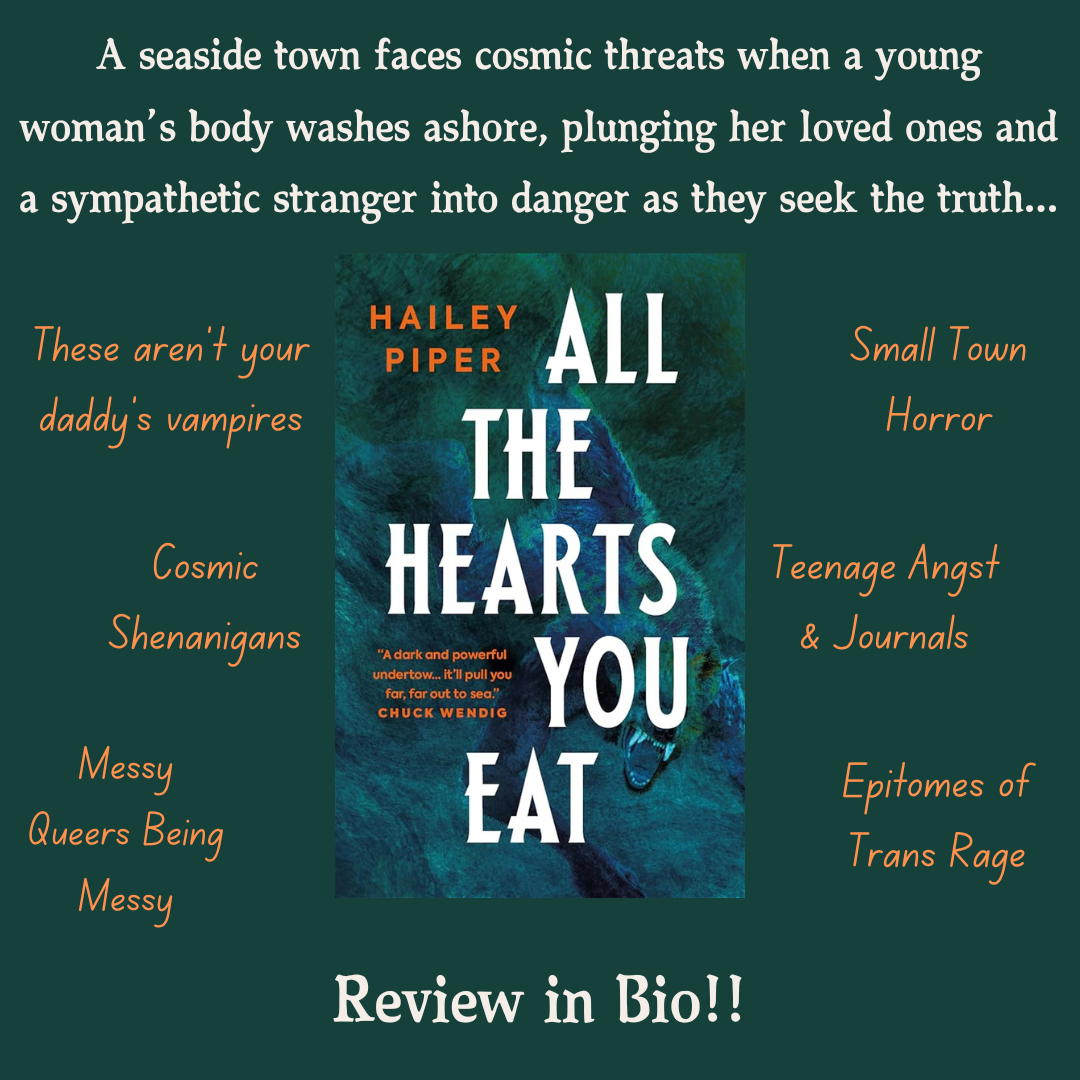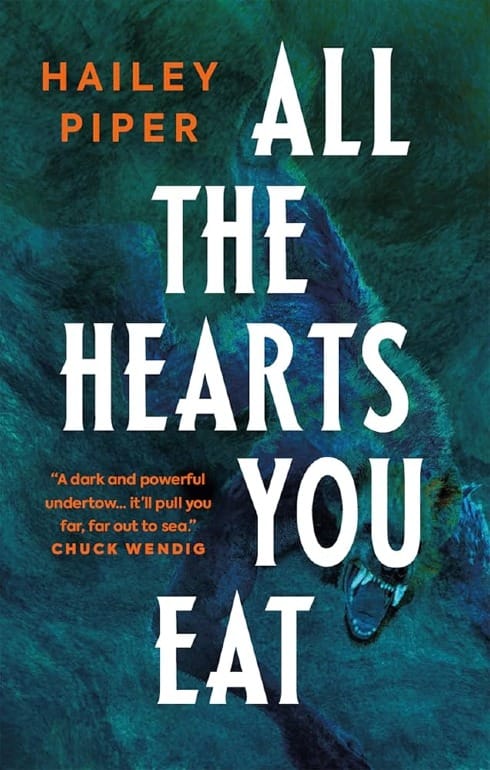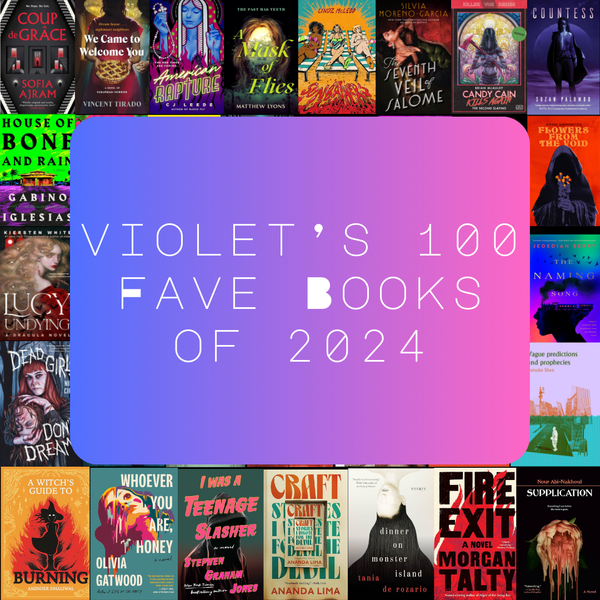Liberation for Some is Not Liberation for All...and Yes, That Includes Vampires - A Review of Hailey Piper's "All the Hearts You Eat"

As the utterly brilliant and relentlessly powerful Audre Lorde once said:
"...the master's tool will never dismantle the master’s house. They may allow us temporarily to beat him at his own game, but they will never enable us to bring about genuine change. And this fact is only threatening to those women who still define the master’s house as their only source of support.”
This quote has stuck with me ever since I first read it, and has further shaped the way I view liberation, as well as the concept of reformism, which is attempting to bring about social change from inside of the systems that oppress us. While I've never believed in a solely reformist ideology, I understand those who are drawn to its promise. I mean it makes sense, right? Why not go in and force change from the inside?
Unfortunately, I've seen one too many well meaning folks enter into these structures with an entire golden road of intentions, yet eventually revealing themselves to be uninterested in doing the dirty work that leads to effective change. But Violet, they could be playing the long con and this is all just a ruse, I might hear some folks say, and yes, that would be wonderful, but the reality is far more disappointing.
Modern American politics have predominantly added to a structure that already existed and benefited a singular vision for a singular race. With the rise of Christian nationalism and the moral majority, politics took a decidedly firm turn to the right, erasing any pretense of these folks working for our best interests. Looking from Reagan onward, we can see how much of this shift has effected the entire country, as well as the most marginalized communities within it.
Reformism ultimately fails because as much as we want to believe cinematic dreams of infiltration and dismantling of oppressive systems, the master's tool will never allow itself to be destroyed. As much as we love mocking politicians for their seeming ineptitude, they built the machine to work, and it must keep working until something gives. To enter into these systems is to quickly learn that you're to play ball, otherwise your time there will be dizzyingly short. It's kind of like the Batman-ism of "You either die a hero or live long enough to see yourself become a villain."

While I would never claim to know Hailey Piper's intentions as a writer, anyone paying attention to her work knows to expect some form of political ideologies/messages nestled in the story to bring a readers attention to something maybe they hadn't thought of before. So, with 2024 entering the chilling final months of its tenure, the Bram Stoker winner has one last treat for fans before the year's out in the form of the epic, All the Hearts You Eat.
I have a bit of a confession to make. Earlier this summer I was talking (probably whining) a bit about how 2024 kind of feels like the year of the vampire in horror. There have been A LOT of vampire books, and while I was skeptical of a glut of fanged content I know better than to doubt the talent of my friends and faves when it comes to writing engaging vampire narratives that don't feel like retreads. I may have been wary when first approaching this novel, but I knew Hailey would likely wow me in ways I wouldn't expect.
And boy, did she.
All the Hearts You Eat is a novel that slyly tips its hat to the influences within. Part Salem's Lot, part Lost Boys, yet always uniquely Hailey Piper, the vampires found in the gaping maw of this story are far more terrifying than many we've seen for the past few decades. They represent one of the most fundamental truths of this world, and it's here we return to Audre Lorde.
"...the master's tool will never dismantle the master’s house. They may allow us temporarily to beat him at his own game, but they will never enable us to bring about genuine change. And this fact is only threatening to those women who still define the master’s house as their only source of support.”
I talk a lot about white supremacy as a metaphor within modern horror. As one of the clearest forms of haunting we've witnessed over the course of human history, it's a specter whose efficacy throughout horror and its subgenres is especially successful, being that horror can be one of the easier tools with which to drive home political statements.
While Piper's vampires are not a metaphor for white supremacy, they do represent something equally as destructive–oppressors masquerading as liberators. I will dig deeper into this, but first, a quick synopsis of the novel.
A Body, A Struggle, A Betrayal - Welcome to Cape Morning
Ivory is looking to take her typical morning run when she discovers something horrific on the beach. A young girl's body has washed up on the shore and she finds a small piece of paper containing a final poem by one Cabrina Brite.
Finding herself drawn to understanding who this young girl was, she finds herself engaging with Cabrina's two closest friends, Xi and Rex, who attempt to keep the girl's memory alive by consistently defacing the gravestone her mother erected as a way to control the information coming out about her daughter's death. Viola Brite is a congresswoman for this seaside town, and the only thing she cares about more than winning her reelection is asserting that Cabrina was raised as male.
That's right, ladies and germs, we've got a trans story on our hands!! **busts out the streamers and party hats**
As Ivory works to uncover the mystery behind Cabrina's death, she snags the attention of something far older and more malevolent than a transphobic politician. She's haunted by dreams of a shadowy imitation of a landmass off the coast of the town, Ghost Cat Island, and is finally visited by what she calls a Cosmic Cat, who brings her impossibly to this shadow version of Cape Morning where Ivory finds her body has been transformed, her genitals now morphed to fit her desired secondary sexual characteristics.
It's here that Cosmic Cat offers Ivory a choice. Presenting what appears to be a dripping heart, she can eat it and receive anything she wants, as well as help bring Cabrina Brite to justice. Seeing it as her only recourse, as well as an aid in her quest to avenge the girl's death, Ivory consumes the heart and is relinquished from the sea, only she is not the only one. A gorgeous naked woman stalks from the waves, confusing our heroine. Is she here to assist in the quest? Is she from Ghost Cat Island too? Before there's too much time to think about it, the woman goes to bite Ivory's neck, causing her to attempt an escape, but it's much too late. Ivory belongs to Honey now.
From here we follow several threads, as Xi and Rex seek to free a vampiric Cabrina from the horrific fate she faces, as well as Ivory falling deeper and deeper into the thrall of Honey's ever-darkening plans. For Honey needs a key, and while Cabrina was not the key she was looking for, perhaps Ivory can be...
"Revenge was a holiness beyond good and evil" - The Exploitation of Trans Struggle
Throughout the history of storytelling, we've witnessed countless characters fall into dangerous and exploitative situations as a reaction to desperate situations. We try to pretend that it could never happen to us, much like with the joining of cults. There's no way we could fall for something like that, the evil is way too obvious. Often, those folks have never found themselves desperate enough.
Ivory may be one of the most complex characters at the center of All the Hearts You Eat. She's a trans woman on the cusp of her 30's, working to survive, dating a man who may as well be a chaser for all intents and purposes, and in seeking to avenge a young trans girl, finds herself collapsing into obsession in a way all too familiar to trans folks.
From the beginning of the novel, Ivory feels the loneliness and alienation that tends to follow in the wake of trans embodiment. She can't feel comfortable in her own skin, and a need for affection sends her into the arms of someone who does not value her–or even entirely see her as human–yet offers a form of the affection she craves. There is a sense of justice drawing her to the mysterious death of Cabrina, especially once she learns the girl was also trans. Anyone with even a modicum of a sense of justice knows how it feels when someone like yourself is harmed or killed. What sometimes happens however, is the wrong type of entity takes notice of your desperation.
Trans folks have been used/viewed as a weapon and shield within the last several presidential elections. Whether we're dangerous abominations to the Right or essential playing chips to Liberals, our autonomy is never truly centered or seen as valuable. A pulsing vein throughout Hearts is a similar sentiment as Cabrina's story is sanitized and wiped clean, as well as how characters treat/react to Ivory. It's the latter who most embodies the sense of rage and vengeance as Honey burrows deeper into her mind, exploiting that hurt to influence Ivory's acceptance toward becoming a key for this ancient race.
Upon their introduction, Ivory hopes that Honey is there to help her help Cabrina but is swiftly attacked and charmed by the vampire, succumbing to her glamours and seeing an "easy way out." This brings me back to reformism, as many often view this as an easier form of revolution than active revolt. Part of this is because reformism often allows us to talk and imagine, while typically achieving very little. As someone who is neurodivergent, I struggle with object permanence, so if something is not directly in front of me, I tend to forget or lose track of it very easily. For reformism, a similar situation arises as it allows for us to "dream" of new worlds, but once the worrisome situation or person or place is out of sight, we're prompted to immediately forget about it.
In the instance of Honey, one could view her and Ivory's vengeance as an active form of rebellion; maybe even conjure the typical boogeymen of ANTIFA and other revolutionary organizations. However, Ivory is acting from a place of desperation, working with a power that seems as though it will help her act from the inside, but ultimately uses her as that essential playing chip. Honey is concerned with power, especially power over a race that has since pushed hers to the shadows, so Ivory's desperation acts as its own aphrodisiac for the vampire, due to her mind being so easily moldable at the hands of something far more powerful and ancient. It's ultimately why their plan for domination eventually buckles.
Ivory sought liberation, yet Honey focused on extermination.
"Transformation did not promise immortality, and immortality did not promise an organic nature." - The Heartbreak & Hope of All the Hearts You Eat
In any genre, but especially horror, not every hero is going to remain one throughout the entirety of a novel. The heartbreaking truth of Hearts is that we are all capable of turning on our fellow humans. The endless cycles of pain and suffering, hurt people hurting people, etc are hot-beds for an eventual villainous transformation, especially when your character is effortlessly manipulated by the force of evil they're contending with.
Allow me to be nerdy for a moment and evoke Star Wars. Something most of us miss, especially upon our first viewings of the original sagas, is just how complex much of Anakin's turn to the dark side is. It's been explored further and with much more soul-crushing efficiency in the animated Clone Wars series, but what appears as a simple Hero's Journey tale is far more nuanced when we take the political struggles into account, and how intrinsically these machinations leave Anakin open to manipulation.
No matter how many times we display these mistakes on page or screen, we never seem to learn the lessons of our own hubris. Nowadays, I witness many claim things like "mAyBe ThAnOs WaS rIgHt" or "tHe EmPiRe HaD tHe RiGhT iDeA," which often succeeds in completely missing the point of a lot of these narratives in the first place.
Empire, no matter who you are, is BAD. We may be taught as a country that imperial rule and settler colonialism is a stupendous thing, and that genocide is a necessary means to an end, but that's the entire point of an empire. They can't succeed if they haven't convinced the people of their project's necessity. Otherwise we would actually have pitchforks in our hands instead of #CeasefireNow tweets.
Honey wants her cosmic vampire legion to take over, hence why they immediately start picking townsfolk off one by one once the key has let them through. This is not a "two-state solution", it's a replacement of one race over the other through active violence and extermination.
Xi and Rex are obviously focused on Cabrina, their sense of community that was lost through extreme violence. They immediately see through Honey's machinations, even expressing their own apprehensions concerning Ivory earlier in the story. They know what Honey's plans and wants are, and it becomes evident that Ivory's mind has been so thoroughly broken by the vampire she becomes a lost cause. In other words, Ivory attempted to work within a structure–albeit a supernatural and cosmic one–to bring justice to Cabrina's memory, but ultimately joined the most exploitative form of liberation, which is not liberation at all. Xi and Rex are able to stem the tide by breaking through Honey's hold on Cabrina, because as we know, love will always win over manipulation.
Final Thoughts
Now, I know none of you signed up for political theory in your book reviews. Where I typically sprinkle these bad boys throughout my reviews, this book struck me so hard as a conversation of where we are in many liberation movements. No matter who you fight for the hardest, we're all interconnected in the ways our larger structures do us harm. What's going on in Gaza and Sudan and Congo and North Carolina and Florida and even Ukraine–these impact all of us, and the sooner we work and fight together, the sooner we can more concertedly prompt liberation for ALL and not merely liberation for SOME.
My reading of this book will be infinitely different than most folks, that is the beauty of reading and literature as a whole. This is not the Definitive™️ read of All the Hearts You Eat, and most likely was not directly what Hailey Piper set out to say with this novel. However, through its narrative, there are themes that speak to these ideas and ideals. My mind remains consumed by the never-ceasing injustices we are forced to pay witness to every day, so perhaps I was looking for it in this book. I don't think so.
Much like the classic works of beloved horror authors, the fiction often speaks to the truth of things, or at the very least, a truth of things. Hailey Piper continues to employ these truths throughout her fiction, and they're ones that allow readers to find them throughout the story. Hearts in particular feels similar to a King novel, but for a contemporary audience and readership. Being her longest book to date, it's absolutely the most exploratory of its characters and themes. You will not find any vampire novel quite like it, and it certainly presents a new and exciting template for how we can tell future vampiric stories. No matter how much time goes by, Hailey Piper continues to deliver.
All the Hearts You Eat is now available from Titan Books. Please read this fantastic novel and give her a shout out. She always appreciates it. Also be sure to catch her at any of her upcoming events!
Thank you endlessly to Titan for offering me a finished copy of this behemoth. I cherish it every day and looks so pretty on my shelves.
And to YOU, the reader, thank you so much for reading this. I know it's a lot different than my usual reviews, but when the topic calls, it CALLS.
If you're new to this page, please consider subscribing for more reviews and cultural criticisms!
Seeya next time, and if it's not before Halloween, a joyous Samhain to you and yours. <3




